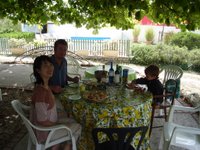When the EU Spoke Latin
Finland held the Presidency of the European Union during the latter half of 1999. On the Presidency Internet site a news report in Latin, 'Conspectus rerum latinus', edited by Dr Tuomo Pekkanen and Dr Reijo Pitkäranta, was published weekly. The news service drew quite some international attention, though many commentators mistakenly interpreted the use of Latin to be related to the dispute over the status of German language in the meetings. Reijo Pitkäranta tells that the production of the Latin news report was agreed long before the language dispute broke out. The initiative had came from the Ministry for Foreign Affairs: the father of the idea was Mr Yrjö Länsipuro, the Director General at the Department for Communication and Culture, who had requested Ms Liisa Ahtiluoto, the editor in chief of the Presidency site to contact Pitkäranta on Spring.
The press especially in Germany and Italy was eagerly reporting the issue. A German daily newspaper even published its editorial in Latin. The sympathies of the highly dramatised articles in Italian news papers were clearly on the Finnish side, though the stories did not always have too much to do with the reality. Moreover, the use of Latin in Finland was even made a domestic policy weapon in Italy.
Finns lost their minds irrevocably assessments in German press
On 17 July 1999, Die Welt published its editorial 'Latinitas et ordinatrum portabile' entirely in Latin, though accompanied with a German translation. In the beginning of the article, the Latin news report is considered to some degree as an attack against Germany. In the end, the author Thomas Schmid notes, however, that the Finns have managed to demonstrate how a modern information society rests on dignified tradition.
In turn, Hamburger Morgenpost published on 17 July 1999 an article titled 'Die spinnen, die Finnen' (approximately: 'Crazy, the Finns '), according to which Finland stakes the new stage of the language dispute with the Latin language. To avoid diehard reputation, the Precidency is now offering news in classical Latin language on its internet site.
Berlin-based Der Tagesspiegel points out in an article published 20 July 1999 that this is the first time in th EU history that the Presidency regularly publishes news in Latin. The paper believes that Finland thereby responds to Chancellor Gerhard Schröder's claim that it would not be doing enough for the linguistic plurality of the Union.
Finns chew Latin like chewing gum - Italy rapt
Rome-based La Repubblica tells on 9 July that the EU President Finland is sending 'messages in the language of antiquity as protest'. According to Repubblica, the internet service reveals to those understanding the language of Caesar and Virgil that Finland's six-month presidency has begun. The author Nello Ajello asks: why this, and other things too, must be told in Latin? He thinks the answer is obvious: for revenge, to strike back.
With reference to the Winter War, Ajello also notes that the Finns are by no means necessarily going to be smashed by the Germans renowned by they military tradition, in this 'new anti-imperialistic war'. The Finns are not launching their counter-attack from scratch, but 'armed to the teeth'. The author thinks that to us Finns, Latin is the second language, which we 'chew like gum' and not only study but also vigorously spread to the world.
It seems that not only the origins of the Latin language news service, but also the phonetics of the Finnish language remain obscure to the reporter; videlicet, he states along the lines 'We people of the third millennium, in our desire for comfort, easily tend to think that better Latin than Finnish - at least Latin has less consonants'.
Still in the same article, there is an anecdote from 1952 Helsinki Olympics, claiming that during the Games, Italian journalist Gianni Brera would have interviewed Paavo Nurmi in Latin, which would have been the only common language for the two.
In Italy, the position of Latin at schools has long been under dispute. The local school reformers have been complaining that the share of Latin in teaching is excessive. Milan-based Corriere della sera discussed the issue on 16 July 1999 under title 'Latino, per fortuna c'è la Finlandia' ('Latin, fortunately there is Finland'), smoothly transiting from the EU language dispute through the Finland's Presidency site's Latin news service to the Italian education policy. To conclude, reporter Luciano Canfora wonders if the Italians truly need to wait an external signal from Finland to appreciate the importance of Latin.
A week later, 21 July 1999, in Corriere Riccardo Chiaberge interviewed President Ahtisaari, the subduer of Milošević. 'Gutta cavat lapidem', Ahtisaari begun his reply. A moment later the President is thinking back the beginning of his secondary school Latin book: 'Italia est insula'. As the reporter is puzzled by the sudden change in the geography of his homeland, Ahtisaari perceives his error, it was of course 'Sikilia est insula' (orthography by Corriere). Then Latin is left a side for a while, though the reporter does know that Finland wants for annoyance of the Germans to make Latin the official language of the EU. Untill the end of the interview, where Chiaberge induces President and the Finnish people to declare: 'Cives finnici sumus. Semper ad maiora!'.










